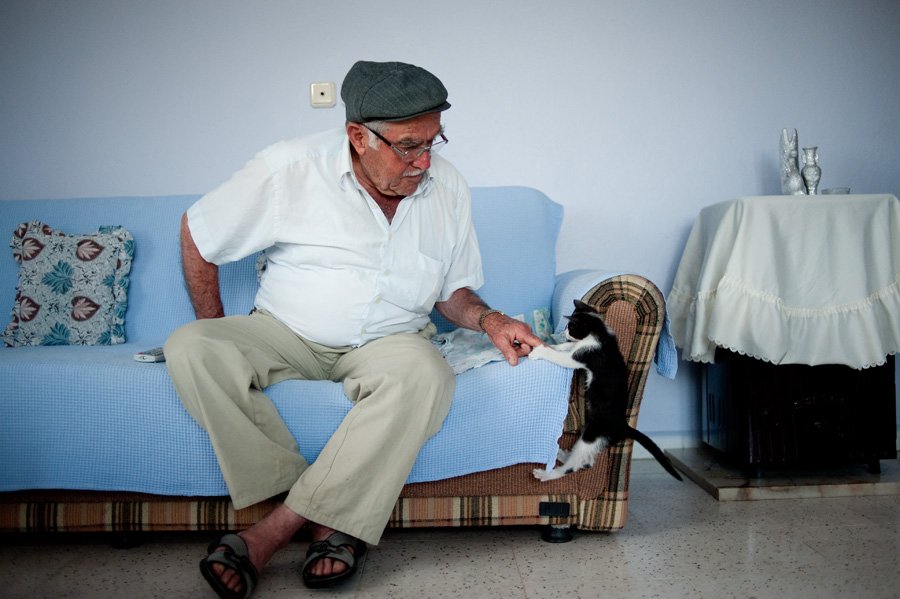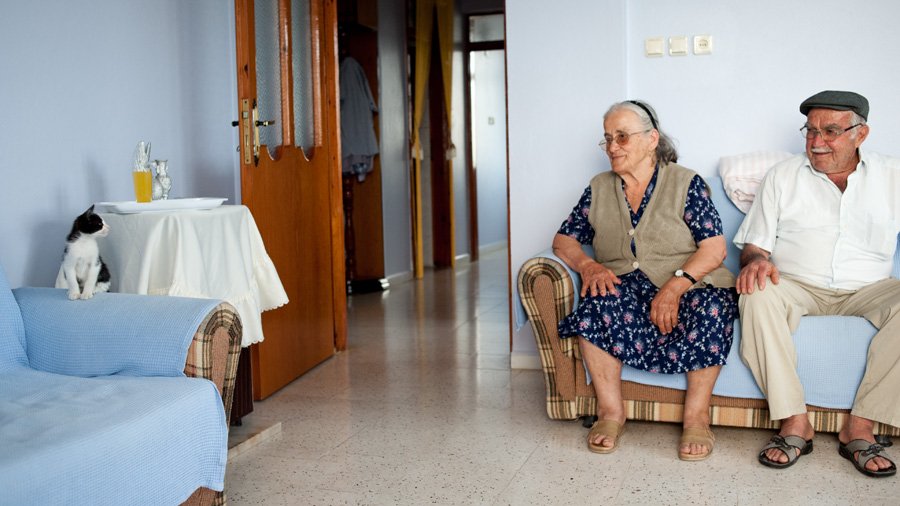 Siruhi reaches out to pet Tommy.
Siruhi reaches out to pet Tommy.
 Sirop plays with Tommy.
Sirop plays with Tommy.
Where the main road of Vakıflı splits into two, one road heading straight past the church, the other veering to the left, there sits a two-story blue house. In the blue house is a blue room. In the blue room are five couches, all covered in blue felt blankets. And on one of the couches is a woman, dressed in a blue patterned skirt and with a thick sweater wrapped around her shoulders.
“Tommy!” she laughs.
The black-and-white kitten pounces on her leg then quickly begins to chase his tail, catching it between tiny, sharp teeth. The woman, Siruhi Kuş, 79, dips her wrinkled hand up and over Tommy’s fluffy back. Her smile is wide, and her eyes are big and bright behind thick-lensed frames.
“Donkey head,” she affectionately calls the kitten before scooping him up to snuggle in her lap.
Siruhi loves animals. She used to have another cat, one who was very smart, she says. He would follow commands like a dog, and he loved to eat bread.
“But he was hit by a car,” Siruhi says, her hand stroking the purring Tommy.
With that, she scoots the animal off her legs and pushes herself up, her right hand tightly gripping the wooden cane she uses for balance. She walks slowly out to the balcony, the kitten racing around her ankles.
On the balcony is a man also dressed in blue, his gnarled hands resting on the big dining table. Heavy glasses slip down his nose, but he scoots them up with a thick finger, his eyes focused on his wife.
Sirop, 81, and Siruhi were born, raised and married in Vakıflı. They have never, they are proud to say, lived anywhere else. Three of their four children have scattered, abandoning the village for bigger and better opportunities, but their oldest son, Harutyun, remains with them. Their two daughters live in Turkey, and their other son lives in France.
“We went to go visit [them in France],” says Sirop, “but then everyone left to go to work. I told Siruhi, ‘Why did we come here? This is what we had in Vakıflı.’”
They chuckle at the anecdote, and their eyes meet. They have decades of memories between them, starting with Sirop’s first view of her as he was walking to the village church.
“She’s a good one, I thought. Let’s ask about her. It took a year to convince her grandpa.”
Siruhi came from a wealthy family, Sirop explains. He came from a poor one. It took him four years to save up for a wedding, but that wealth paled in comparison to Siruhi’s grandfather’s approval.
“He said, ‘[Sirop] is young and brave. He can feed her.’”
Now married for 57 years, Sirop and Siruhi are enjoying their twilight years together. Siruhi bakes bread and pastries and draws entertainment and comfort from her kitten. Sirop wanders down to the coffee house every day to play backgammon and reminisce with his friends.
Siruhi says that they are not afraid of dying, of leaving their children and grandchildren.
“World stays in world,” she says. “Even if you owned the whole world, you’d leave it all and go. We’ll all go.”
 In between portrait shots, Sirop and Siruhi Kuş cannot keep their eyes off their new kitten, Tommy.
In between portrait shots, Sirop and Siruhi Kuş cannot keep their eyes off their new kitten, Tommy.